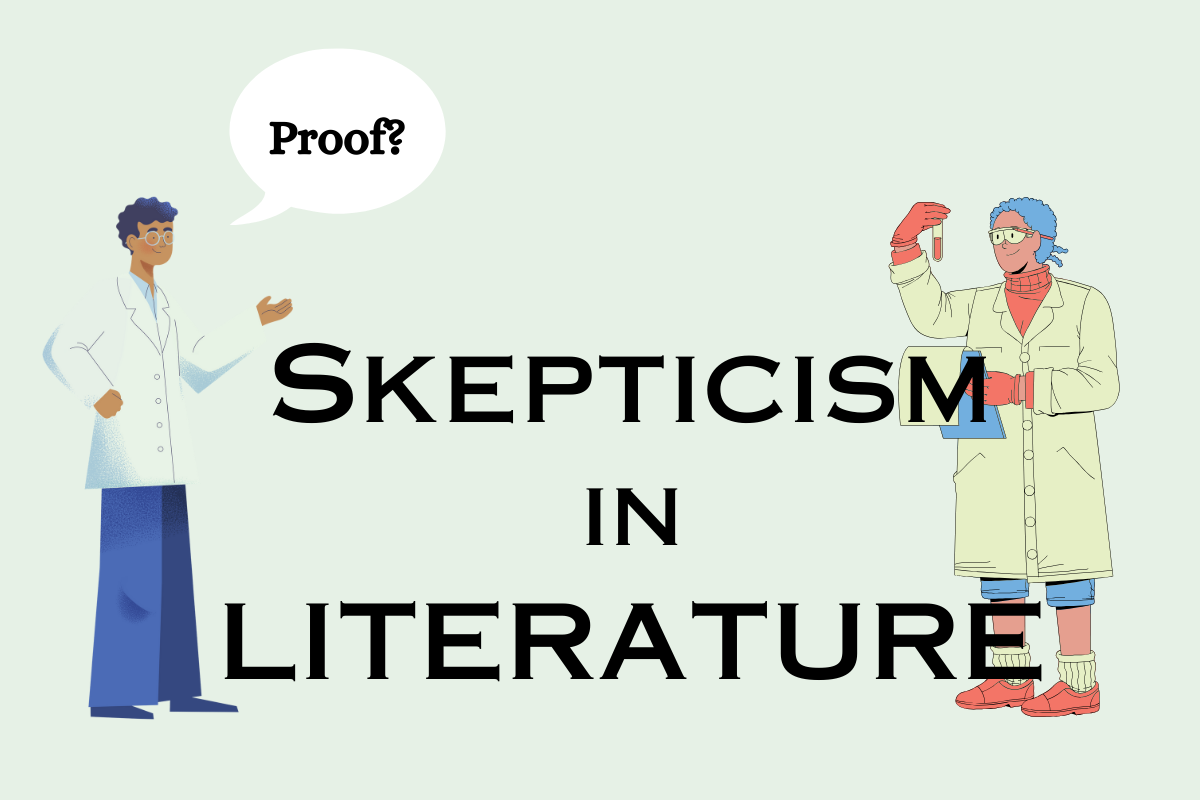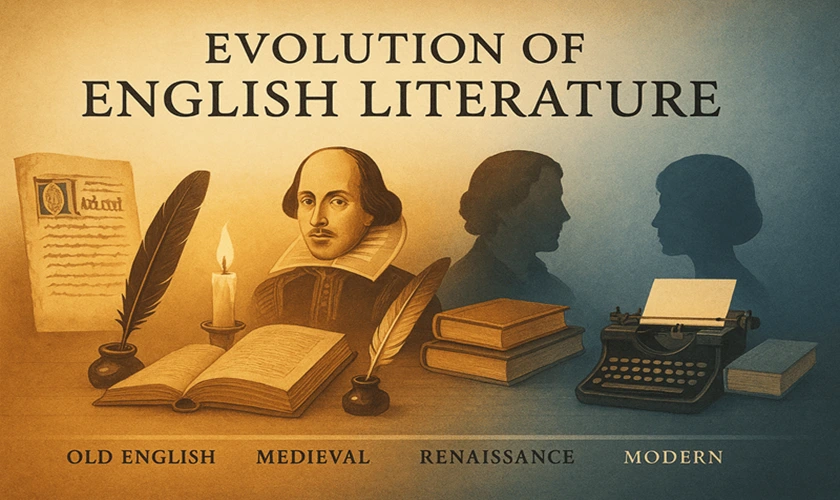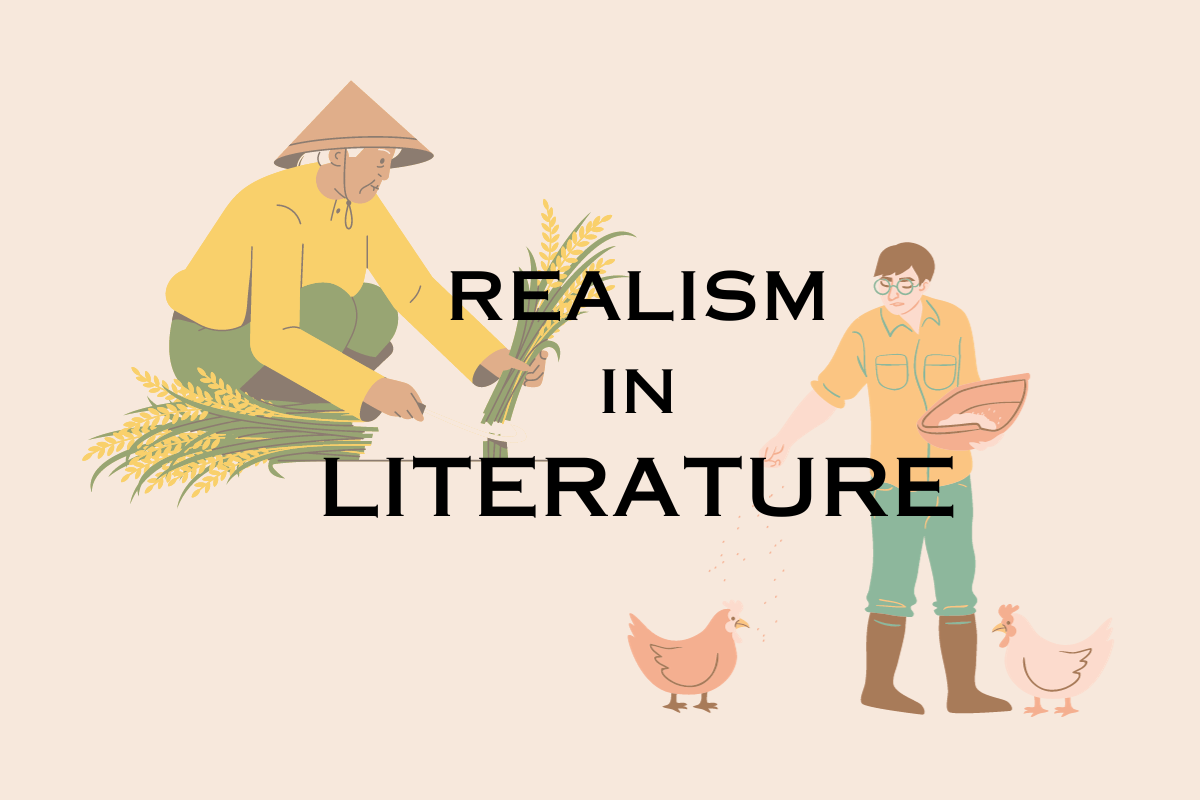Skepticism in literature is an intellectual approach that involves questioning and doubting established beliefs, ideas, or claims. It emphasizes critical thinking and scrutiny of information, requiring evidence and rationality before accepting something as true. Skepticism provides a basis for scientific inquiry and encourages a healthy skepticism towards unsupported claims, leading to a more informed and discerning perspective in areas such as science, politics, and everyday decision-making.

Characteristics of Skepticism in Literature
Skepticism in literature is a philosophical viewpoint that involves having a critical and questioning mindset towards beliefs, knowledge, and claims. It encourages doubting and being reluctant to accept ideas or assertions without proper evidence. Here are some important characteristics of skepticism:
1. Doubt and Questioning: Skepticism is anchored in doubt and the willingness to question assumptions, beliefs, and claims. Skeptics possess a natural curiosity and strive to scrutinize the validity of ideas.
2. Demand for Evidence: Skeptics are individuals who value evidence and empirical support when forming beliefs or evaluating claims. They aren’t easily convinced by appeals to tradition, authority, or emotion; they seek concrete facts, data, and logical reasoning.
3. Critical Thinking: Being skeptical encourages the development of critical thinking skills. Skeptics engage in careful analysis of arguments and evidence, identifying any logical fallacies or inconsistencies in reasoning.
4. Open-Mindedness: While skeptics are naturally cautious about accepting claims, they are also open to changing their views when presented with compelling evidence. Skepticism is not about stubbornly clinging to one’s beliefs but about being open to revising them based on new information.
5. Healthy Skepticism vs. Cynicism: It’s important to differentiate skepticism from cynicism. While skeptics approach claims with caution, they are not inherently negative or distrustful of every claim.
6. Empiricism: Skeptics often prioritize empiricism, which is the reliance on direct sensory experience and observation as the main avenue for acquiring knowledge. They value evidence that can be tested and validated through thorough observation and experimentation.
7. Skepticism Across Disciplines: Skepticism goes beyond philosophy and plays a crucial role in domains such as science, where it forms the basis of the scientific method. Scientific skepticism involves thorough testing and verification of hypotheses.
8. Balancing Belief and Doubt: Skeptics aim to strike a balance between belief and doubt by acknowledging the importance of having some level of belief for practical purposes. However, they also prioritize keeping their beliefs aligned with the available evidence.
9. Challenging Pseudoscience and Superstition: Skepticism plays a crucial role in questioning and examining pseudoscientific claims, supernatural beliefs, and superstitions. Skeptics promote the critical evaluation of these assertions.
10. Promoting Rational Discourse: Skepticism promotes rational conversations and productive debates. It fosters respectful discussions that rely on evidence and logical reasoning to support claims.
11. Ethical Considerations: Questioning moral beliefs and principles, exploring ethical dilemmas, and seeking rational justifications for ethical stances are all part of ethical skepticism. It encourages a skeptical approach to ethics and morals.
12. Suspension of Judgment: Skeptics approach things differently. They take their time to carefully consider all perspectives and thoroughly evaluate the evidence before forming an opinion.
13. Intellectual Courage: Skeptics are individuals who are unafraid to challenge the prevailing norms or question figures of authority. They possess a willingness to advocate for their beliefs, even in situations where those beliefs may not be popular.
Concepts and Examples of Skepticism in Literature
Skepticism is a recurring theme in literature that challenges commonly accepted beliefs, assumptions, or truths. It encourages readers to question and explore alternative perspectives. There are several different types of skepticism depicted in literary works:
1. Philosophical Skepticism
This type of skepticism explores the field of epistemology, which examines the boundaries of human knowledge and the trustworthiness of our beliefs. Philosophical skeptics frequently cast doubt on the ability to attain absolute certainty, sparking profound philosophical investigations in literature.
- Example: The works of existentialist writers like Jean-Paul Sartre, who question the existence of objective truths and values, often incorporate philosophical skepticism.
2. Moral Skepticism
Moral skepticism examines the uncertainty and subjectivity surrounding moral values and ethical principles. In literature, characters or situations are often presented to challenge established moral norms, compelling readers to reconsider their own ethical beliefs.
- Example: In Fyodor Dostoevsky’s Crime and Punishment, the protagonist Raskolnikov grapples with moral skepticism as he contemplates the justifiability of murder.
3. Religious Skepticism
In literature, religious skepticism is often explored through characters who question the existence of a higher power, contemplate the meaning of life, or challenge the validity of religious doctrines. These narratives provide valuable insights and critiques of organized religion.
- Example: Salman Rushdie’s The Satanic Verses confronts religious skepticism through a fantastical narrative that questions religious dogma and faith.
4. Social Skepticism
In literature, social skepticism revolves around questioning societal norms, hierarchies, and institutions. Authors employ their works to scrutinize existing social structures and encourage readers to challenge established power dynamics.
- Example: George Orwell’s 1984 is a classic example of social skepticism, highlighting the dangers of totalitarianism and mass surveillance.
5. Political Skepticism
Political Skepticism in literature frequently entails the critique of political ideologies, governments, or systems. Authors utilize their writings to question political authority and examine the repercussions of unregulated power.
- Example: Aldous Huxley’s Brave New World engages with political skepticism by presenting a dystopian society that questions the cost of stability and conformity.
6. Scientific Skepticism
Doubt and ethical concerns about scientific advancements and technological progress are common themes in science fiction literature. Authors often delve into the potential consequences of tampering with the natural order, raising important questions and exploring various perspectives.
- Example: Mary Shelley’s Frankenstein raises scientific skepticism by addressing the moral implications of creating life through scientific means.
7. Existential Skepticism
Existentialist literature delves into the depths of existential skepticism, probing the very essence and significance of life in a universe that appears indifferent. These works often explore the profound anxiety and despair that stem from grappling with existential uncertainty.
- Example: Albert Camus’ The Stranger portrays the existential skepticism of its protagonist, Meursault, who confronts the absurdity of life.
Apart from these literary examples, here are some examples of skepticism in action:
- A scientist who doubts the findings of another scientist and conducts their own research to confirm or refute the results.
- A journalist who thoroughly investigates a contentious topic and interviews multiple sources to provide a well-rounded and balanced perspective.
- A voter who takes the time to educate themselves on the candidates and their stances on various issues before making their decision at the polls.
- A consumer who reads product reviews and compares prices before making a purchase.
Recommended: Mysticism in Literature | Characteristics and Famous Writers
Famous Skeptical Character in Literature
Skepticism in literature spans from timeless classics to modern novels. Allow me to present a few examples of skeptical characters found in literary works:
- Hamlet: In Shakespeare’s play Hamlet, the main character wrestles with philosophical skepticism. He constantly questions the reliability of his own senses and whether the world he perceives is truly real.
- Jay Gatsby: In F. Scott Fitzgerald’s The Great Gatsby, the protagonist challenges the ideals of the American Dream and questions the values that defined the Roaring Twenties.
- Dr. Frankenstein: In Mary Shelley’s Frankenstein, the protagonist defies natural laws and showcases a skeptical approach towards science by bringing a living monster to life.
- Atticus Finch: In Harper Lee’s To Kill a Mockingbird, Atticus Finch is a social skeptic who stands up for justice in a racist society.
- Winston Smith: In George Orwell’s 1984, Winston Smith is a political skeptic who rebels against the totalitarian government of Oceania.
- Brother Cadfael: In Cadfael Chronicles by Ellis Peters, Brother Cadfael is a fictional character who is known for his skepticism and critical thinking skills
- Sherlock Holmes: Sherlock Holmes is a famous detective who is known for his logical and skeptical approach to solving crimes
- Dr. Gregory House: Dr. House, the renowned medical doctor from the TV show House, is recognized for his skeptical nature and exceptional critical thinking abilities. He approaches medicine in a unique and unconventional manner.
- Ellie Arroway: In Contact by Carl Sagan, Ellie Arroway is portrayed as a scientist who holds a skeptical viewpoint towards conventional religious beliefs. Instead, she dedicates her efforts to searching for concrete evidence of extraterrestrial life.
Prominent Skepticist Writers
Prominent skepticist writers are those who have expressed doubt, questioned prevailing beliefs, and challenged established norms and ideologies through their literary works. These writers have used skepticism as a tool to provoke critical thinking, encourage inquiry, and explore the complexities of human existence. Here are some notable skepticist writers:
1. Friedrich Nietzsche (1844-1900): Nietzsche’s philosophical works frequently confronted established religious and moral beliefs. Through influential texts like Thus Spoke Zarathustra and Beyond Good and Evil, he delved into the repercussions of the death of God and advocated for individuals to forge their own values and meanings in life.
2. Voltaire (1694-1778): Voltaire, a prominent figure of the Enlightenment period, was renowned for his sharp wit and skeptical nature. In his satirical novella Candide, he cleverly critiques the prevailing optimism of the era while simultaneously mocking philosophical and religious convictions.
3. Albert Camus (1913-1960): Albert Camus, a notable philosopher and writer in the existentialist tradition, delved into profound subjects such as absurdity, the lack of inherent meaning, and the complexities of human existence. His renowned works like The Stranger and The Myth of Sisyphus critically examined these themes, approaching them with a healthy dose of skepticism regarding the pursuit of intrinsic purpose in life.
4. Mark Twain (1835-1910): Mark Twain’s works, including The Adventures of Huckleberry Finn and The Mysterious Stranger, frequently incorporated satirical elements that challenged the social and moral norms of his era. His skepticism towards hypocrisy and bigotry was palpable in his critiques.
5. H.L. Mencken (1880-1956): H.L. Mencken, a renowned American journalist and essayist, was recognized for his cutting commentaries on religion, politics, and society. His essays and columns showcased his skepticism and rebelliousness.
6. Bertrand Russell (1872-1970): Russell, a renowned philosopher and essayist, was recognized for his skeptical views on religion and his promotion of rationalism and logic. One of his notable works, the essay Why I Am Not a Christian, showcases his perspective grounded in skepticism.
7. Christopher Hitchens (1949-2011): Hitchens, known as both a writer and journalist, was widely recognized for his outspoken atheism and criticism of religion. In his book God Is Not Great: How Religion Poisons Everything, he provides an extensive critique of organized religion from a skeptical perspective.
8. David Hume (1711-1776): Hume, a renowned Scottish philosopher, had a profound impact on Western philosophy through his empirical and skeptical views. In his notable works like A Treatise of Human Nature, he raised significant queries about the fundamental aspects of knowledge, causality, and induction.
9. Ambrose Bierce (1842-1914): Bierce was a journalist and satirist renowned for his cynical and skeptical perspective. One of his notable works is The Devil’s Dictionary, which consists of clever and ironic definitions that satirize different facets of society.
Through their unique perspectives and literary styles, these writers have made significant contributions to the tradition of skepticism in literature. They have defied conventional beliefs and prompted readers to critically examine both the world around them and their own convictions. Their impactful works serve as a catalyst for introspection, inspiring individuals to contemplate fundamental questions concerning existence, morality, and the essence of humanity.
Recommended: Naturalism in Literature | Characteristics and Authors




